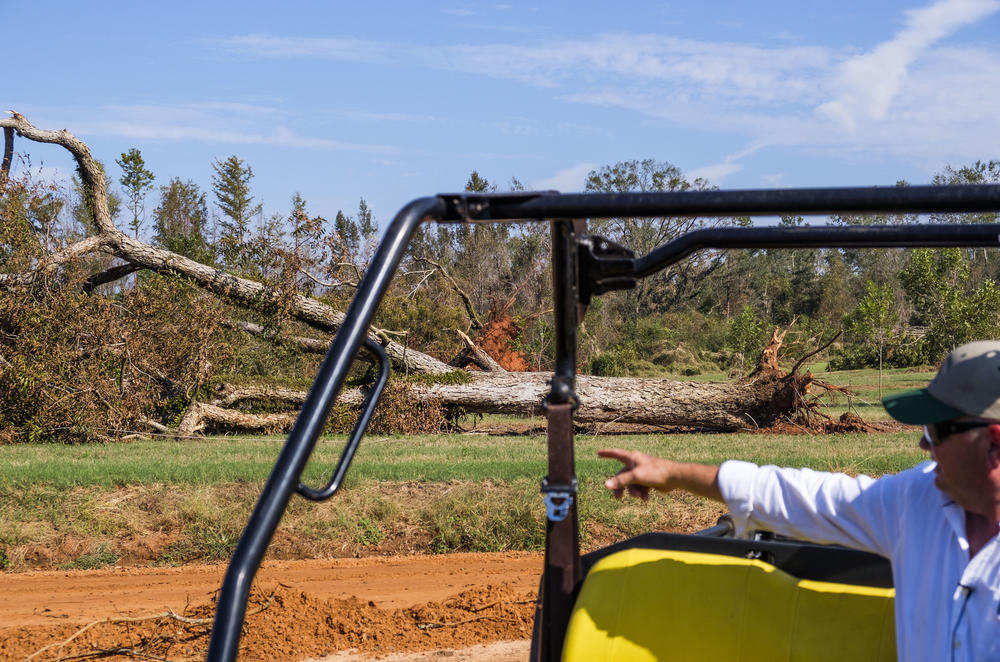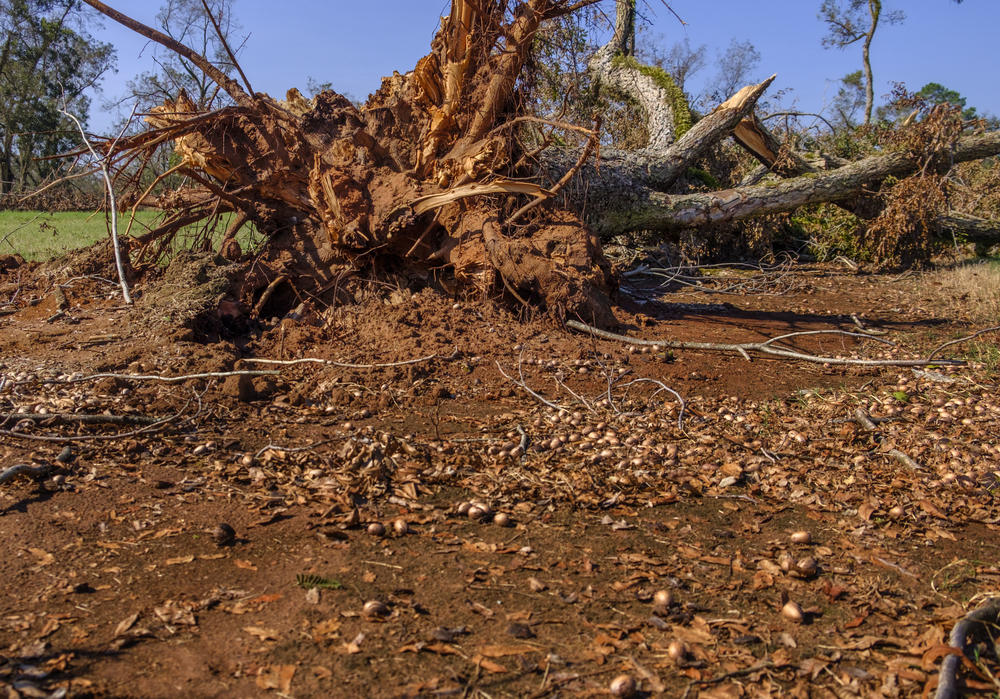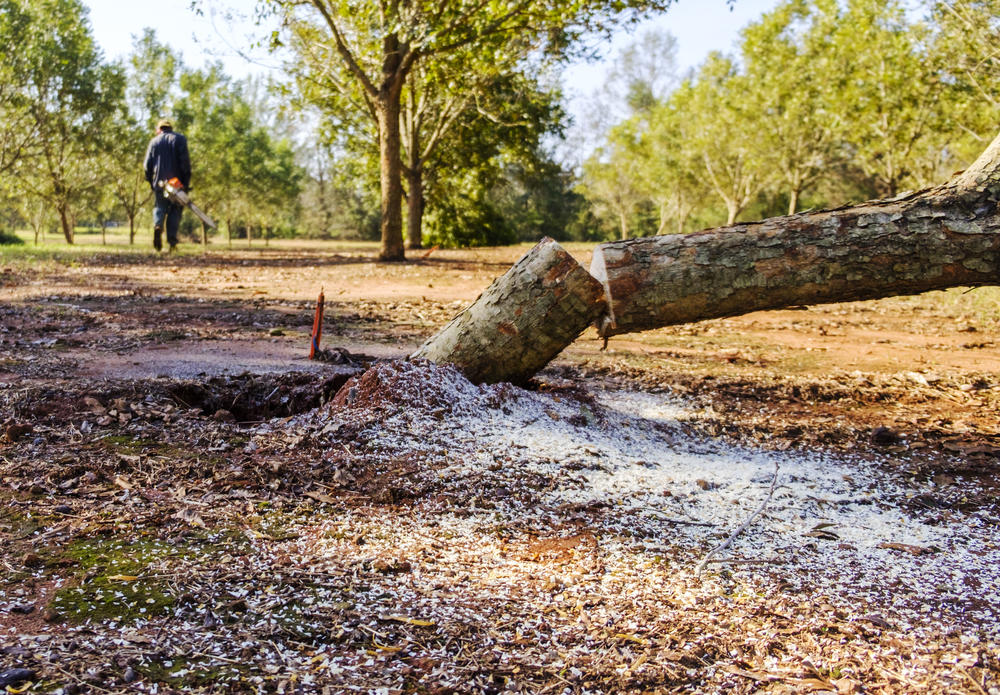Section Branding
Header Content
Long Road For Pecan Growers Hit By Hurricane Michael
Primary Content
Tucked away in a corner of the Pine Knoll Pecan Grove near the town of Pretoria is one of those things that Mitch Bulger says made the decades he spent living and working here worth it.
"I promise you,” he told me. “Stick your finger in that. It’s the coldest water.”
For Pecan Growers Hurt By Hurricane Michael, A Long Recovery
A flock of about half a dozen water birds flew through the cypress trees bordering the bubbling, spring fed pool where he sat. It was full of debris from Hurricane Michael, but Bulger wanted me to imagine it cleaned up. And yes, this summer swimming hole was, in fact, cold. A fact that made Bulger laugh a little.
“Lot of good time back here,” he said, remembering the years spent raising his family on this plantation he’s managed for twenty years.
The family that owns the plantation is mostly scattered to Colorado and Rhode Island. For Fulger, this is the only home his kids have ever known. He said it’s been a good life.
“This means everything to me,” he said.
That’s a sentiment on a lot of farms around southwest Georgia that were hit with something like a bomb when Hurricane Michael plowed into the state last week. Cotton fields near harvest were blown bare and decades old pecan groves like the ones at Pine Knoll were leveled. Bulger is only now starting the work of recovering.
Put the cold spring at your back and you’re looking at one of the thousands of Pine Knoll pecan trees, some a century old, laid low by Hurricane Michael. These giants were literally the moneymakers here. That’s the name of breed of tree, Moneymaker. Bulger said its one of the oldest breeds going.
The trees were ripped up from their tap roots, the crowns all pointing west. The roots were caked in red clay. In between, pecans were piled like gravel in a dry stream bed.
"A hand crew could get in here and salvage a lot of this,” Bulger said looking at one puddle of nuts.
The titanic trees on the ground were in the way of the tractors that usually do the job of harvesting, but good luck finding the labor to get them up.
“I had a crew Monday and now I don’t have a crew,” Bulger said. “I paid them 25 cent and they still didn’t stay.”
That’s 25 cents a pound. A good hand picker can bring in 100 pounds a day, so that’s a $25 paycheck. Bulger said the problem was the crew didn’t want to wait until the end of the week to get paid.
“They don’t want to show up until they get out of money again. That’s when they want to work,” he said.
VIDEO: Around Pine Knoll
So this oldest, most profitable grove on the farm is done. In a good year, these nuts would have been headed to China. Not this year.
“This year we didn’t contract a nut because China wasn’t buying,” Bulger said.
That’s because of the tariffs on pecans that cropped up in the US/China trade war. Georgia growers had been looking at a year when nuts intended for China would be dumped into American markets, thereby depressing prices. And now?
“I don't know that we can supply what our Americans need,” Bulger said.
There’s still money to be made in the smaller grove of seven year old trees, though it didn’t escape damage. Eric Woods was walking the rows with a chainsaw. Lots of trees that were still standing had broken taproots. Dead leaves were the give awat. Woods was cutting those trees down. He said he’d cut over a thousand trees in a week.
“Hard work, but it’s got to get done,” he declared.
Behind Woods came a small bull dozer to pick up the limbs, but Bulger said there was still plenty of hand work to do.
“Our Hispanic help that helps us every year, they are picking up limbs behind us,” Bulger said, pointing to a crew of about six workers.
These were $10 an hour jobs. Behind, a harvester tossed a steady, if thin, stream of nuts into a hopper. They’ll likely end up in high end gift packs. Mitch Bulger said with the loss of the massive, productive trees, these younger trees are the short term future of the Pine Knoll plantation.
“We get those lean years coming ahead of us and we'll, you know, we'll work around them,” Bulger said.
Bulger said that means replanting and tending and waiting for decades. It’s something he’s used to.
“There's stuff I planned to do 20 years ago that I still hadn't got to,” he said. “So I'm still got goals that I'm working toward.”
Bulger said his goal now is to hang around long enough to see the Pine Knoll Pecan Plantation thick with Moneymakers again.




